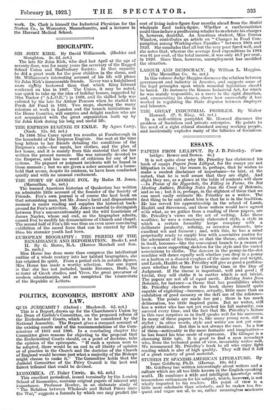ESSAYS.
PAPERS FROM LILLIPUT. By J. B. Priestley. (Cam- bridge: Bowes and Bowes. 13s.) It is not quite clear why Mr. Priestley has christened his book of essays Papers from Litliput, for the essays are not lilliputian in size ; the reason is, perhaps, that he wishes to make a modest disclaimer of importance—to hint, at the outset, that he is well aware that they are slight. And slight they are, as a glance at the table of contents will show —In Praise of the Hyperbole, On Filling in Forms, On Not Meeting Authors, Holiday Notes from the Coast of Bohemia, and so on ; but it is, perhaps, in the slightest of them that we can most easily estimate Mr. Priestley as a writer. The first thing to be said about him is that he is in the tradition. He has served his apprenticeship in the school of Lamb, Hazlitt and Stevenson, and those writers would have agreed with what, as we gather from a reading of these papers, are Mr. Priestley's views on the art of writing. Like those worthies, he uses a consciously elaborated style, a style in which a certain formality keeps company with a deliberate jocularity, refining, as occasion demands, into excellent wit and humour ; and, with this, he has a mind perpetually ready to supply him with associative matter for the adornment of his theme, so that the theme, often trivial in itself, becomes—like the conveMent branch to a swarm of bees—a mere supporting skeleton for the style and the varied associations to clothe. The dancers in the penny-in-the-slot machine will dance equally well whether you drop in a penny or a button or a disused eyeglass of the same size and weight, and Lamb, Hazlitt or Mr. Priestley will give as good a perform- ance whether the theme be Chewing Gum or the Day of Judgment. If the theme is important, well and good ; if trivial, they will clothe it in matter which is not trivial. The papers aye not all of equal merit. Holiday Notes from Bohemia, for instance—a theme that has possibilities which Mr. Priestley elsewhere in the book shows himself quite capable of exploiting—becomes, actually, little more than an exhibition of good memory or the deft use of the reference- book. The points are made too pat ; there is too much deliberation, too little inspired gusto. But no writer, still less a writer who has not yet reached his full maturity, can succeed every time, and the fact that Mr. Priestley's failure in this case surprises us in itself speaks well for his successes. In many of these papers he is, like many young men, still a stylist ; in other words, style and writer are not yet com- pletely identical. But this is not always the case. In a few of them—noticeably in the more fantastic and imaginative— he has found his true mode of expression. The Glimpse is a charming little tale. It is good to find a man nowadays who, from the technical point of view, invariably writes well. We recommend Mr. Priestley's book to all who enjoy light reading which is also of high quality. They will find it full of a great variety of good material.










































 Previous page
Previous page